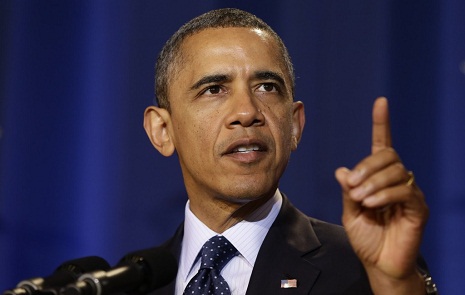Obama vows to veto any Republican attempt to derail Iran nuclear deal - VIDEO

The president said the agreement, which provides Iran with extensive sanctions relief in return for curbing nuclear activities and accepting rigorous inspections, was not based on trust with Tehran, which he acknowledge is a longtime enemy of the United States, bur rather “built on verification”.
“I am confident that this deal will meet the national security needs of the United States and our allies, so I will veto any legislation that prevents the successful implementation of this deal,” he said.
“We do not have to accept an inevitable spiral into conflict, and we certainly shouldn’t seek it.”
It is highly unusual for the White House to schedule a formal presidential announcement as early as 7am and the remarks, which were broadcast live in Iran, and choreographed to follow swiftly after diplomats unveiled the contours of the agreement in Vienna.
But Obama’s address signalled a determination on the part of his administration to contain the growing chorus of opponents on Capitol Hill, where Republicans, who control both chambers of the legislature, are determined to find a way to scupper the agreement.
Under the terms of an oversight process agreed between congressional leaders and the White House in April, Obama has five days to present the deal to lawmakers. The Senate and House of Representatives then have 60 days to scrutinise the deal and hold hearings, during which time the president cannot begin lifting sanctions on Iran.
Toward the end of that period, congressional leaders are expected to table some kind of resolution to mark the legislature’s disapproval of the agreement, which would be politically embarrassing for the president but not prevent sanctions from being waived.
In order to kill the final deal, which follows on from a framework agreement forged three months ago, Obama’s Republican critics would need to overcome a presidential veto with a two-thirds majority vote in both chambers – an extremely high hurdle, even with support from those Democratic hawks known to be strongly opposed to the agreement.
“I welcome scrutiny of the details of this agreement,” Obama said, adding “this is not the time for politics or posturing”.
“Tough talk from Washington does not solve problems,” he said. “Hard-nosed diplomacy, leadership that has united the world’s major powers, offers a more effective way to verify that Iran is not pursuing a nuclear weapon.”
He added: “This deal meets every single one of the bottom lines we established when we achieved a framework earlier this spring. Every pathway to a nuclear weapon is cut off. And the inspection and transparency regime necessary to verify that objective will be put in place.”
Obama’s remarks lacked the triumphalism that might be expected from a legacy-defining agreement that stems from his contentious policy, announced as a first-time presidential candidate in 2008, to begin talks with Tehran without preconditions.
In an effort to mollify opponents on Capitol Hill, the Obama administration is keen to acknowledge that while the deal may not be perfect, it contains the necessary safety mechanisms, including a provision to snap back to sanctions if Iran is not compliant, and remains the best option on the table.
It is a case that is based on the realpolitik of international relations as much as the merits of the agreement.
Nodding to that approach, Obama emphasised what he said would be the consequences if there was no agreement and the international consensus, which has brought the US together with five other world powers including Russia and China, falls apart.
“Consider what happens in a world without this deal,” he said. “Without this deal there is no scenario in which the world joins us in sanctioning Iran until it completely dismantles its nuclear program. Nothing we know about the Iranian government suggests it would simply capitulate under that kind of pressure.”
Obama added: “No deal means no lasting constraints on Iran’s nuclear program. Such a scenario would make it more likely that other countries in the region would feel compelled to pursue their own nuclear weapons, threatening a nuclear arms race in the most volatile region of the world.”















































